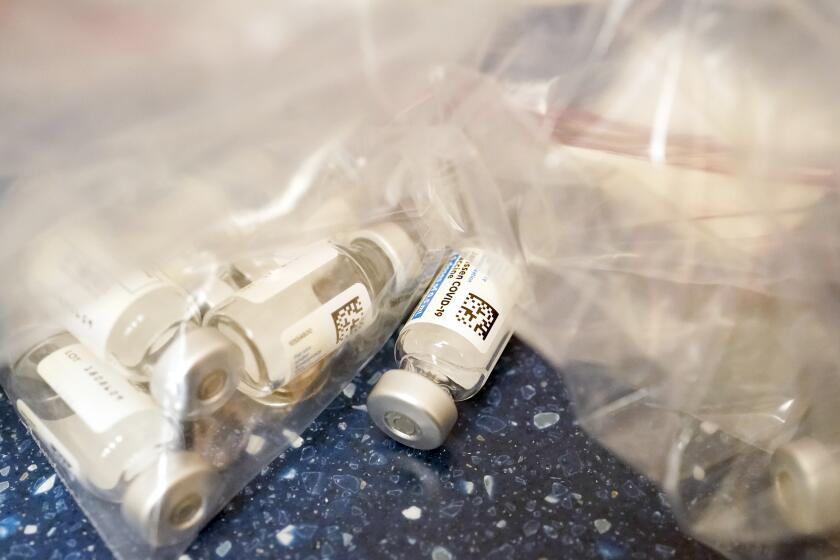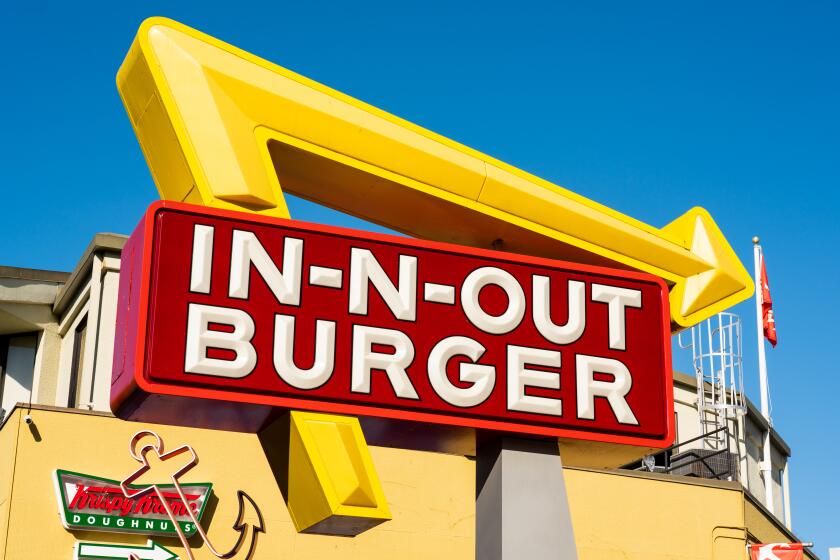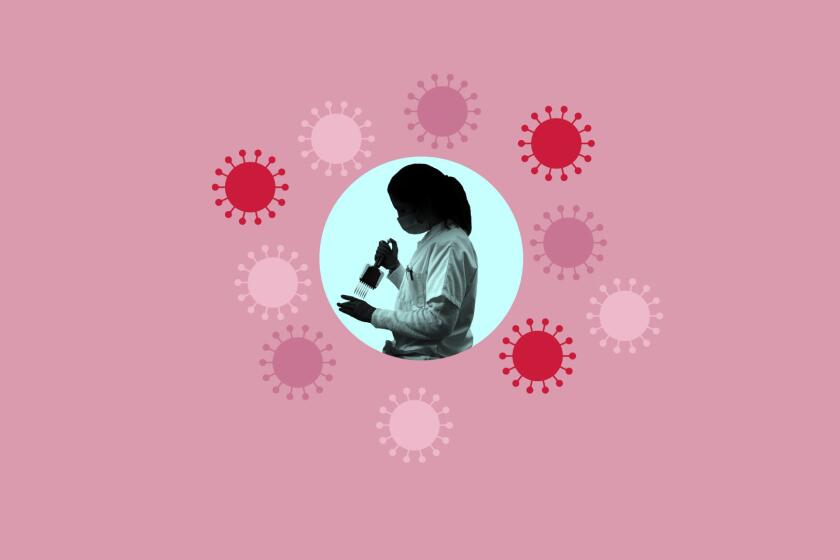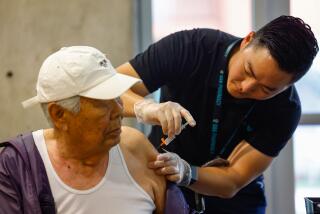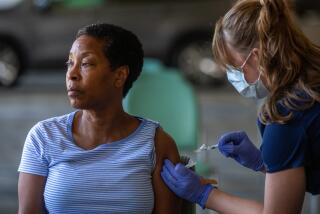Millions more Californians are now eligible for COVID-19 vaccine booster
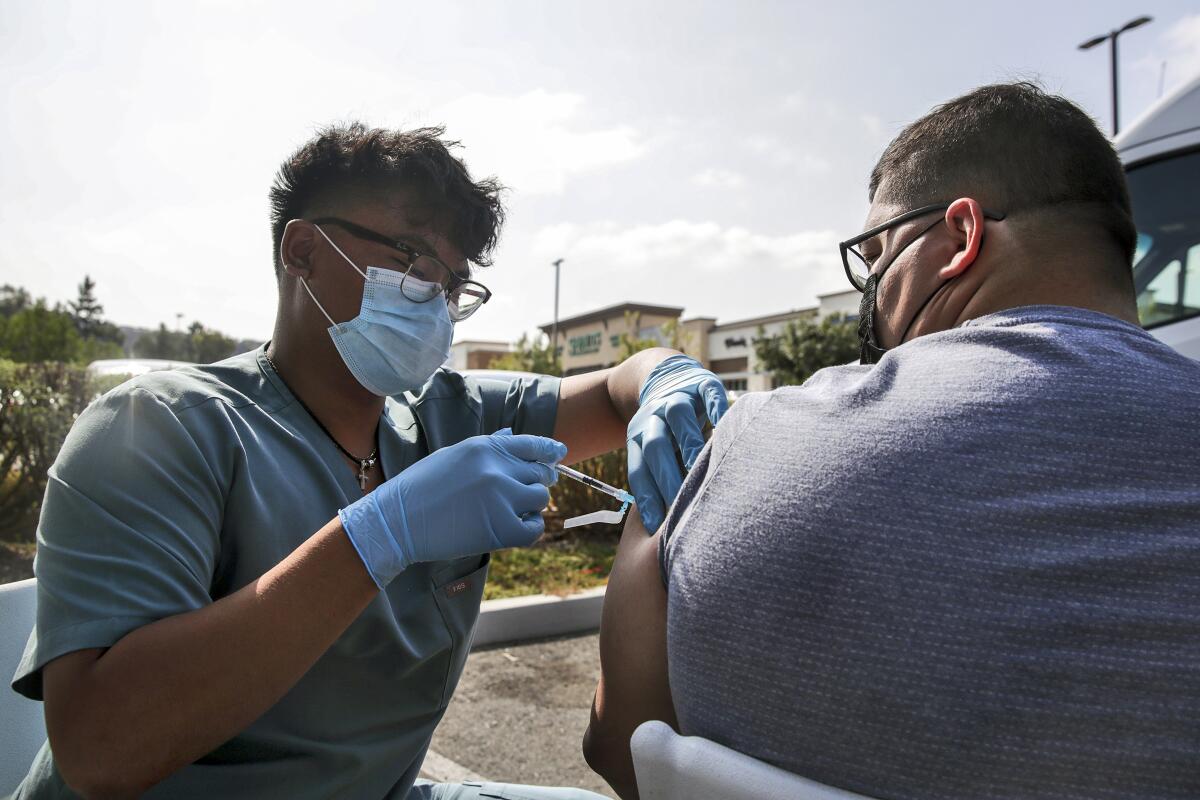
- Share via
The campaign to insulate California against another winter coronavirus surge got a major shot in the arm when federal health officials adopted criteria that will allow millions of additional residents to receive COVID-19 vaccine booster shots.
It is particularly urgent that all seniors age 65 and older, as well as adults 50 and older with underlying health conditions, and anyone who got the Johnson & Johnson vaccine get additional doses of any COVID-19 vaccine, health experts and officials say.
“Don’t delay it,” Los Angeles County Public Health Director Barbara Ferrer said. “While the vaccines, as you’ve seen, are super powerful, still, there is some waning of protection” months after the initial dose of vaccinations, especially for people at highest risk of hospitalization and death.
Booster shots are expected to be widely available in California starting Saturday. After Dr. Rochelle Walensky, director of the U.S. Centers for Disease Control and Prevention, approved the new recommendations Thursday night, the Western States Scientific Safety Review Workgroup, a coalition of public health experts from California, Nevada, Oregon and Washington, issued its own sign-off Friday afternoon.
“If you’re eligible — get your booster,” Gov. Gavin Newsom tweeted Friday morning. “Protect yourself and loved ones this winter.”
A panel of U.S. government experts has endorsed extra doses of all three of the nation’s vaccines.
Experts have been worried that demand has been sluggish for booster shots among adults who became eligible weeks ago. One possible explanation is that previous recommendations were confusing, said Dr. Sara Cody, the public health director for Santa Clara County, Northern California’s most populous.
Now, all vaccinated adults with high risk of COVID-19 complications are urged to get a booster shot.
“If you’re 65 and up, we really want you to get out there and get your booster,” Cody said. All adults with underlying health conditions — which includes being overweight or having high blood pressure, depression or diabetes — are also eligible for the booster.
Officials are also giving the option for all adults to get the booster if they live or work in settings at higher risk for coronavirus exposure, such as employees of hospitals, schools and grocery stores.
Before Thursday, booster shots had been recommended only for older or high-risk adults who received the Pfizer vaccine, and third full doses had been recommended for immunocompromised people who had received the Pfizer or Moderna shots.
Those who are immunocompromised should get a full additional dose of vaccine, experts said.
The booster dose for the Moderna shot is half the amount given in each of the first two doses; the Pfizer and Johnson & Johnson boosters are the same as the earlier doses of their respective shots.
The CDC also opened the door to “mixing and matching” the vaccines — allowing someone to get a booster dose that’s a different brand from what they initially received. In other words, a Johnson & Johnson recipient could opt to get a booster dose of Moderna or Pfizer.
As more communities across California require proof of vaccination for public venues, the battle over enforcement of the new rules is just beginning to heat up.
A recent preliminary study, funded by the National Institute of Allergy and Infectious Diseases, demonstrated the potential benefits for a Johnson & Johnson vaccine recipient to get a booster shot from a different manufacturer.
The study found that people who originally got the J&J shot and added a Moderna booster had a much higher increase in antibody levels than who received a Pfizer booster or another Johnson & Johnson shot.
It’s impossible to be certain whether a Moderna vaccine is the best choice for those who originally got the J&J vaccine — “it’s logical to believe that higher antibodies are correlated with more protection, but it’s more complicated than that,” Dr. Robert Wachter, chair of UC San Francisco’s Department of Medicine, wrote in an email, noting that the level of antibodies doesn’t always line up with true protection.
Still, “it would be reasonable for a J&J person to get either a Pfizer or Moderna shot — if they’re equally easy to get, then I might slightly favor Moderna,” he said. “I’d prefer either over another J&J.”
Federal officials declined to give recommendations on which booster shot is best.
“If you’ve got J&J followed by a Moderna or Pfizer, you got a really robust antibody response. But we saw some data also from J&J that demonstrated that J&J folks who got boosted with J&J had a really good clinical response as well,” Walensky told the ABC News program “Good Morning America. “So really, this is about personal preference and talking to your physician about what’s best for you.”
As for people who originally received the Pfizer shot, it probably doesn’t matter whether the booster is Pfizer or Moderna, and for those who got the Moderna series the first time around, there’s no reason to switch to Pfizer, Wachter said.
The coronavirus can keep evolving as long as people are still getting infected, but that doesn’t mean new variants will be more dangerous.
He suggested that vaccinated people with compromised immune systems get an additional full dose of the Moderna vaccine, as the data indicate that shot has led to a stronger antibody response than other vaccines.
Health experts say immunocompromised people should get another vaccine dose as soon as possible. “They may have gotten very limited protection from their first two doses, and so it really is a matter of rendering vaccination effective,” Wachter said.
Generally speaking, it’s a little less urgent for healthy, younger adults to get a booster shot, but Wachter still recommends that those who are eligible — such as a healthy 40-year-old doctor or nurse — get them.
For younger, healthier adults, “the main reason to get it is to prevent getting a mild case of COVID that will keep them out of work, rather than making a huge difference in preventing hospitalization/death — since their risk is low to begin with and the vaccine is still fairly protective, despite some waning” of immunity, Wachter wrote.
Studies have shown that the immune response to a new coronavirus threat declined more rapidly in older vaccinated people compared to a younger vaccinated person, said Dr. Regina Chinsio-Kwong, a deputy health officer for Orange County.
She and others have warned it’s possible there could be an uptick in coronavirus cases in the coming weeks, as people increasingly stay inside while colder, wetter weather sets in.
Britain is a good example of what could be in our future, Chinsio-Kwong said. The U.K. has a higher vaccination rate than the U.S., but it has experienced a rise in coronavirus cases that shows no sign of abating.
“Remember, their [latest] surge started before ours, and it went down slightly around September and then it kicked back up,” Chinsio-Kwong said. Britain is also dealing with a Delta subvariant called AY.4.2; Walensky said there’s no evidence AY.4.2 impacts the effectiveness of the current vaccines and has been identified only occasionally in the U.S. There has been reportedly one case in California.
But some “scientists are concerned it may have increased transmissibility compared to Delta — the original Delta variant,” Chinsio-Kwong said. “Until we’ve reached a point where most are immune across the world, none of us are safe from COVID.”
Though millions of Californians soon will be able to get a booster shot, officials expressed confidence that there will be ample supply and that existing vaccination networks will be able to accommodate the increased demand.
“There are no lines right now,” Ferrer said. “It’s pretty easy to get in and get out very quickly.”
More to Read
Sign up for Essential California
The most important California stories and recommendations in your inbox every morning.
You may occasionally receive promotional content from the Los Angeles Times.
